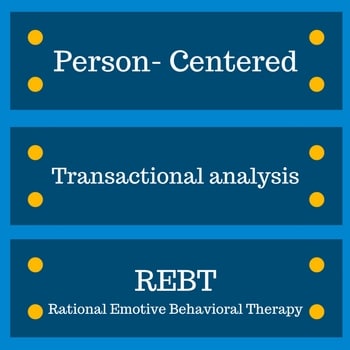4 Counselling Approaches Explained
In this section, we compare the different counselling approaches, looking at the differences and the similarities.
We compare person-centred therapy, transactional analysis, and rational emotive behavioural therapy. We also look at the future of counselling.
The person-centred approach to counselling belongs to the humanistic school of therapy and was devised by Carl Rogers, an American psychologist who.
In the 1950s, he proposed a form of therapy that focused on the clients' experience of themselves.
Rational Emotive Behavioural Therapy (REBT) belongs to the behavioural School of therapy.
REBT is a theory devised by Albert Ellis, an American psychologist, who in the 1950’s founded the ABCD technique. Ellis believed that we can think our way out of distress.
The Transactional Analysis approach to counselling belongs to the Psychoanalytical School of therapy and was devised by Eric Berne a Canadian psychiatrist in the late 1940’s.
He believed that human beings have three distinct attitudes or states of mind which he called Ego States.
Gestalt therapy focuses on the process, i.e. what is happening, rather than on the content.The goal is for clients to be aware of what they are doing, how they are doing it, and how they can change themselves and learn to accept themselves.
The central concept of the Gestalt approach is ‘wholeness’
Free Handout Download
Counselling Approaches Quick Comparison Checklist
In comparing the different approaches in counselling, we see there are many similarities between some of the models, and we see some stark differences.
Explore the history and underlying philosophies of the models under comparison and identify the key principles that differentiate each model.
Let us look at the counselling approaches to be compared:
Different Counselling approaches
Why have different counselling approaches?
This question is asked a lot. For the record, there are hundreds of different types of talking therapy, but all of them find their roots in the three approaches covered.
The reason there are differing approaches is that not all human beings are the same. For some of us have difficulties that may be better suited to one therapy than another.
This is known in counselling circles as 'best fit for client'.
Person-centred therapy is a non-directive form of counselling. As such, it suits people who want to explore issues of personal development, such as relationships, moving on from abuse, and coming to terms with loss.
It is a philosophical approach and so relies on the client being able to change their outlook on life and to value themselves.
For individuals in the grip of addiction, this approach may not offer enough strategies or techniques that the client can use to move on.
Person-centred counselling is relatively short term, with about 14 sessions being the norm, although it can go on for longer.
Transactional analysis is an active directive form of counselling. This means that the counsellor teaches the client the model of counselling and analyses the client's past, sometimes as far back as their childhood.
This form of therapy is very effective for clients who have had difficult early childhoods that have then gone on to affect their behaviour as adults.
However, it is not a quick fix, with sessions that can last for months or even years. If you are a paying client, this can be expensive.

The long timescale may also make it impractical – for example, if you have a fear of flying and are going on holiday next week, this therapy is probably not for you!
REBT (rational emotive therapy) is also an active directive form of counselling. This means that the counsellor teaches the client the model of counselling and techniques that the client can use to change their irrational thoughts and replace them with more useful thinking.
Thus, the mindset of 'I have had three interviews and no job offers' is replaced with 'Perhaps I will have to have lots of interviews before I find work; I just need to keep trying.'
This therapy is usually short-term (typically six sessions) and may not be useful for issues such as bereavement or historical abuse.
Free Handout Download
Counselling Approaches Quick Comparison Checklist




Pingback: First counselling session | Counselling Tutor
just start my counselling course and dduring my research came across this clear and fascinating clarifications about different approach.
Hi,Everyone!I need your help.I’m a graduate student taking up masters.I will be reporting a topic on General approach in counselling in our Guidance&Counselling class.My problem is I can’t find my topic in the internet.Is there such thing as General approach?Do you have any suggestions of reference?Please help!!Thanks!
WHAT IS THE RELEVANCE OF COUNSELING IN THE 21 CENTURY.
DISCUS THE CORE CONDITIONS AND THE APPLICATION IN COUNSELING.
Help my assignment describe range of different approaches to helping using my counselling skills.